Jerry Greenfield of
Ben & Jerry's Ice Cream: "As co-founder of a socially-concerned company, I whole-heartedly
endorse Lynette Yetter's book 72 Money Saving Tips for the 99%.
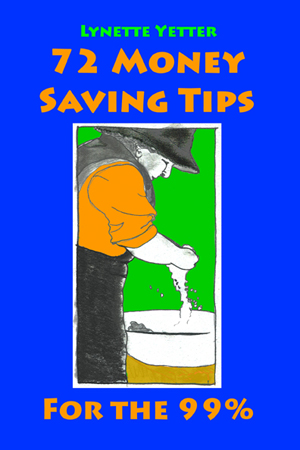 This book is not just one, but many steps in the right direction. It is full of surprising secrets of human happiness -- told with wit and humor." This book is not just one, but many steps in the right direction. It is full of surprising secrets of human happiness -- told with wit and humor."
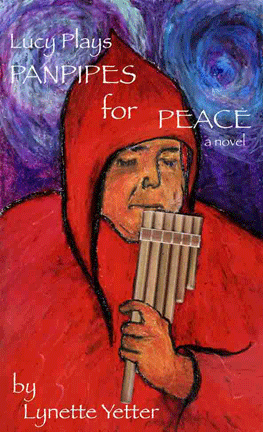
"If you know someone with an
itch to ditch it all and immerse themselves in
another world, get them this riveting account.
It requires courage and imagination for Lucy
to have done what she did, but the main thrust
of this story is that if Lucy can do it, so
can you. And who can't use THAT kind of
inspiration."
- Ellen Snortland, author of "Beauty Bites Beast"
and playwright of "Now That She's Gone"
". . . been enjoying your book
some more today. i love how real it is.
unpretentious. wholesome."
- Tantra
Bensko
"What a great story and a
wonderful character. I love the energy of the
writing and how you are able to capture a
certain movement between the real and
spiritual. You are a gifted writer with a
fresh vision."
-Matthew Lippman, author of the award-winning
"New Year of Yellow" and "Monkey Bars"
"...First Rate"
- Margaret Kiever, Secretary of Sepulveda
Unitarian Universalists Society
"I just finished 'Lucy' and am
impressed. It is so easy to read that quite a
few pages go by before I notice I've been
reading awhile. The greatest strength of the
book is its forthright, straightforward
language and purpose. The stories are clearly
told, and are rounded and interesting. I
enjoyed it all, and certainly hope a paper
edition goes strongly. I hope our personal
endings work as well as you propose for Lucy."
- Lewis Ellingham, author of Poet be like
God: Jack Spicer and the San Francisco
renaissance, and The Birds and
other poems
"But damn, Lynette, your
writing trips beautifully, like wandering
through a bird song filled garden."
- Paul Barnett, author of the
novel Sergio's
Clock
"Very very inspiring"
-Howie Leifer, NYC
"It is a great read! Lynette
has a unique writing style that is so sincere
it captivates your heart, and educates at
once! I loved reading her book."
- Carolina Mendez Alkahmri, Oakland, California
"You had the chutzpah to do the
things I dreamed of doing but never felt brave
enough to do!"
- Carol Hart-Martin, California
GET
INSPIRED with LUCY PLAYS PANPIPES FOR PEACE
Lucy Plays Panpipes for Peace is available now at local
and online
bookstores around the world.
Distributed by Ingram
The Corporate Office
Mamaqocha Titicaca, Tawantinsuyu
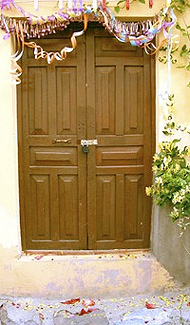
"I have often thought about you
and your genuine love for our music and our
people. In many respects, you are an
inspiration to me! You walk the talk,
and live in accordance with your beliefs.
- Margarita B. Marìn-Dale, Adjunct Professor of Latin
American Studies, American University,
Washington, D.C.
Links to people and music
of the Andes
Language:
Quechua
list
serve
SSILA
(Society for the Indigenous Languages of the
Americas)
Political Action:
Human
Rights
Watch
Amnesty
International
SOA
Watch
Witness
for
Peace
Music, Musicians and
Instruments:
Ayllu
Yachay
Chalena
Vasquez (Authority on music and dance of
Peru)
AIMA
(Asociacion Internacional de Musicos Andinos)
Experimental
Musical
Instruments(Buy quality panpipes)
Peña
Pachamama
Society
for
Ethnomusicology
Museo
Nacional
de Archeologia, Antropologia e Historia del
Peru
Brian
Ransom
Susan
Rawcliffe
Dale
Olsen
Michael
Heraldo's Aztec Stories (For
everything you wanted to know about Aztec
culture, through music and storytelling)
Scott
August (Nammie Winner, Native
Flute)
Huayucaltia
(fusion
music of the Americas. Thank you to Hernan
Pinilla for teaching me kena and zampoña!)
Peter Apel
(happy fun music for children of all ages. My
favorite song is "Sometimes I Eat Oatmeal for
Breakfast". Yum!)
Writers who I admire:
Chalena
Vasquez (Poetry and Prose en Español)
Adair Lara
(great writing teacher and writer!)
Richard
Marcus (Tells it like it is!
Thought-provoking reviews of CDs and Books
from around the world)
Lew
Ellingham (Read his new book, "The Birds
and Other Poems")
Leslie
Mancillas (Honest writing of daily
married life with children, based on deep
spiritual roots.)
Online Radio Stations
Playing Lynette's Music:
KRRC
FM
Frank
Todd Radio
Radio Gente
Celebrate
Radio
More Friends of Lynette's:
SGI
(Soka Gakkai International)
Potters
For
Peace
Blogcritics
V2 Gallery
(fine
paintings and sculpture)
Nina
Kellogg (amazing, beautiful,
powerful ceramic wall installations to bring
your space alive)
Erin Hicks
(check
out her illustrations! It's not everyday you
meet a New York illustrator who gave up a
promising career in the Big Apple to go into
the wilderness and maintain hiking trails and
paint landscape sketches. An artist whose work
will endure through-out history. I believe
that John Muir and Henry David Thoreau are
applauding her)
http://www.welburngourdfarm.com/
(buy
gourds and books to make musical instruments)
Zepti Search
Engine
Secrets of
Luck
|
|
|
 El plan anticrisis ind�gena El plan anticrisis ind�gena
(yorokobu magazine )
Jaled Abdelrahim
La primera vez que a Lynette Yetter, una licenciada en artes pl�sticas californiana de 53 a�os, le entr� la curiosidad por el estilo de vida de las culturas ind�genas del sur de su continente, fue por el o�do. Era 1991 y escuch� en las calles de San Francisco a alguien tocando un instrumento de viento de origen precolonial llamado zampo�a. Fue tal el flechazo por aquel sonido �que hace entrar en armon�a con la Pachamama�, describe, que decidi� aprender a tocarlo. Despu�s vino su devoci�n por estudiar Quechua y las ansias de viajar rumbo al sur para saber m�s acerca de aquellas culturas milenarias.
Desde 1994 pas� temporadas intermitentes integrada con familias y poblaciones aut�ctonas de Guatemala, Nicaragua, Per� y Bolivia. Finalmente, hace doce a�os, acab� por solicitar su residencia permanente en Bolivia y all� trat� de comenzar una aventura empresarial. Trasladar�a productos textiles y musicales que hac�an los artesanos que hab�a conocido en este pa�s a empresas estadounidenses que, en un principio, se mostraron interesadas en vender aquellas manufacturas que ella les ofrec�a.
Empezado el negocio, por el que pagaba un precio justo a �sus amigos� productores, acopi� miles de enseres que a la hora de cerrar los tratos finalmente no pudo vender. �Todo empez� bien pero pronto las empresas estadounidenses se desentendieron. Ten�a ya todo el material adquirido y me arruin�, se lamenta. �Un d�a, en una visita a mi pa�s, entr� a una tienda de Urban Outfitters, una de las corporaciones que me hab�an solicitado prendas que despu�s no compraron, y vi unos chu�llus (gorros de lana t�picos de Bolivia) igualitos a los que me hab�an pedido a m�. Lo primero que hice fue mirar la etiqueta. Pon�a: made in China. Despu�s se enter� por las explicaciones que le dio otra de las industrias con las que negociaba, Andean Textiles, que los productos artesanos que ella tra�a se consegu�an a la mitad de precio importados de China, India o Brasil.
Se rompi� definitivamente su fe en �el sistema capitalista�. Ser�a una devota del modus socioecon�mico de las culturas ind�genas y su manera de cuidar la renta, los recursos y la naturaleza. No quer�a saber m�s ni del T�o Sam ni del American Way of Life. As� que con esas, despu�s de calentar la mu�eca escribiendo su primera novela (Lucy Plays Panpipes for Peace), decidi� publicar un libro para ense�ar a ahorrar y a manejar la econom�a personal de la gente al estilo de aquellas poblaciones de artesanos, agricultores, ganaderos, mineros y m�sicos de zampo�a con los que llevaba a�os conviviendo. Lo llam� 72 Maneras de Ahorrar Dinero para el 99% (72 Money Saving Tips for the 99%). Todo un plan anticrisis ind�gena.
Es consciente de que los detallados m�todos que aqu� propone no son todos realizables �para una persona que viva en un quinto piso� en California, Madrid o la Barceloneta. Pero la mayor�a de ellos pueden ser una buena idea para rebajar el gasto en la casa de cualquiera.
En sus p�ginas aporta consejos y m�todos para aprender hacer cosas que pueden recortar esas peque�as sangr�as �innecesarias�, opina: c�mo hacer tu propio jab�n, tu champ�, tu desodorante, tu maquillaje, tus cremas o tu pegamento. Habla de la inutilidad de algunas prendas de ropa interior, de c�mo evitar el peluquero, c�mo ahorrar calefacci�n y agua caliente, de la manera de hacer longevos tus zapatos, de la cantidad de tiritas, fregonas o toallas que nos podr�amos ahorrar utilizando palos y trapos, de c�mo reducir la factura del agua poniendo un simple dep�sito bajo la lluvia o de lo superfluos que son la mayor�a de nuestros productos electr�nicos teniendo en cuenta que con un ordenador podemos resolver casi todas los servicios que nos brindan los dem�s aparatos.
Es partidaria de la colaboraci�n en comunidad y de los huertos caseros verticales. Contraria a todo tipo de individualismos, los fertilizantes y los qu�micos. �Da�an a las personas y a la tierra�. �As� lo aprend� de los ind�genas. Y adem�s, un c�ncer s� que sale caro, as� que imag�nate qu� manera de ahorrar�, defiende su tesis.
Tal y como propone en su libro, a ella nunca le falta su bolsa de tela a mano para no gastar ni ensuciar con bolsas pl�sticas, realiza sus viajes en transportes p�blicos y sostenibles y hasta aprendi� de lo le�do acerca de las poblaciones esquimales �rticas (los Inuit) sobre c�mo hacer una casa en el hielo sin necesidad de radiador. As� hasta 72 modos de ahorrar en gastos que �cualquiera puede llevar a cabo�.
Sobre sus consejos en los que sugiere conseguir un cerdo, una cabra y una oveja para asegurarse la lana, la leche, el abrigo, el reciclaje de basura y el alimento, reconoce que no es algo realizable para todo el mundo, pero no se apea de sus convencimientos respecto a las dem�s recomendaciones. �Cuando la gente dice que no puede hacer todo eso que yo sugiero, yo les digo: lleva haci�ndose miles de a�os. �Por qu� t� no puedes?�
Yetter, que habla con la experiencia de quien ha saboreado dos tipos de sociedades, conoci� en su antiguo entorno de consumo a cuatro personas cercanas que se suicidaron por preocupaciones financieras. �Fue algo que me impact� mucho�, confiesa, �le daba vueltas cuando conviv�a con una familia en Nicaragua que viv�a sana y feliz sin luz, sin agua, sin calle o sin tel�fono�. Ahora hay un concepto que tiene muy claro: �Todos podemos vivir con un poco menos�.
 REVIEW of
Lucy Plays Panpipes for Peace REVIEW of
Lucy Plays Panpipes for Peace
By Tantra
Bensko
Lynette
Yetter's
novel
draws from her own life when she went to
the Andes, pulled by the sound of the
panpipes as a tool for transformation. Yet
it is fiction, in the way called for in
David Shields' Reality Hunger. It means
more knowing she really did something
truly audacious and death defying. Here,
we get a glimpse of how close to reality
it is, and how the fiction made it into
the powerful book it is.
"Hurtling through space and time, the blue
orb was rapidly self-destructing. Vital
fluids pumped out of its innards burned in
orgies of greed. The vapors ate away its
luminous ozone skin.
Indigenous Elders, you might call them
brain cells of wisdom, were ignored.
New synapses of fiber optic cable and
satellite rays rationalized the
destruction as 'progress.'
Chaos surged like a flooding river."
Thus begins the story in which Lucy goes
to participate in the ancient culture of
the Andes.
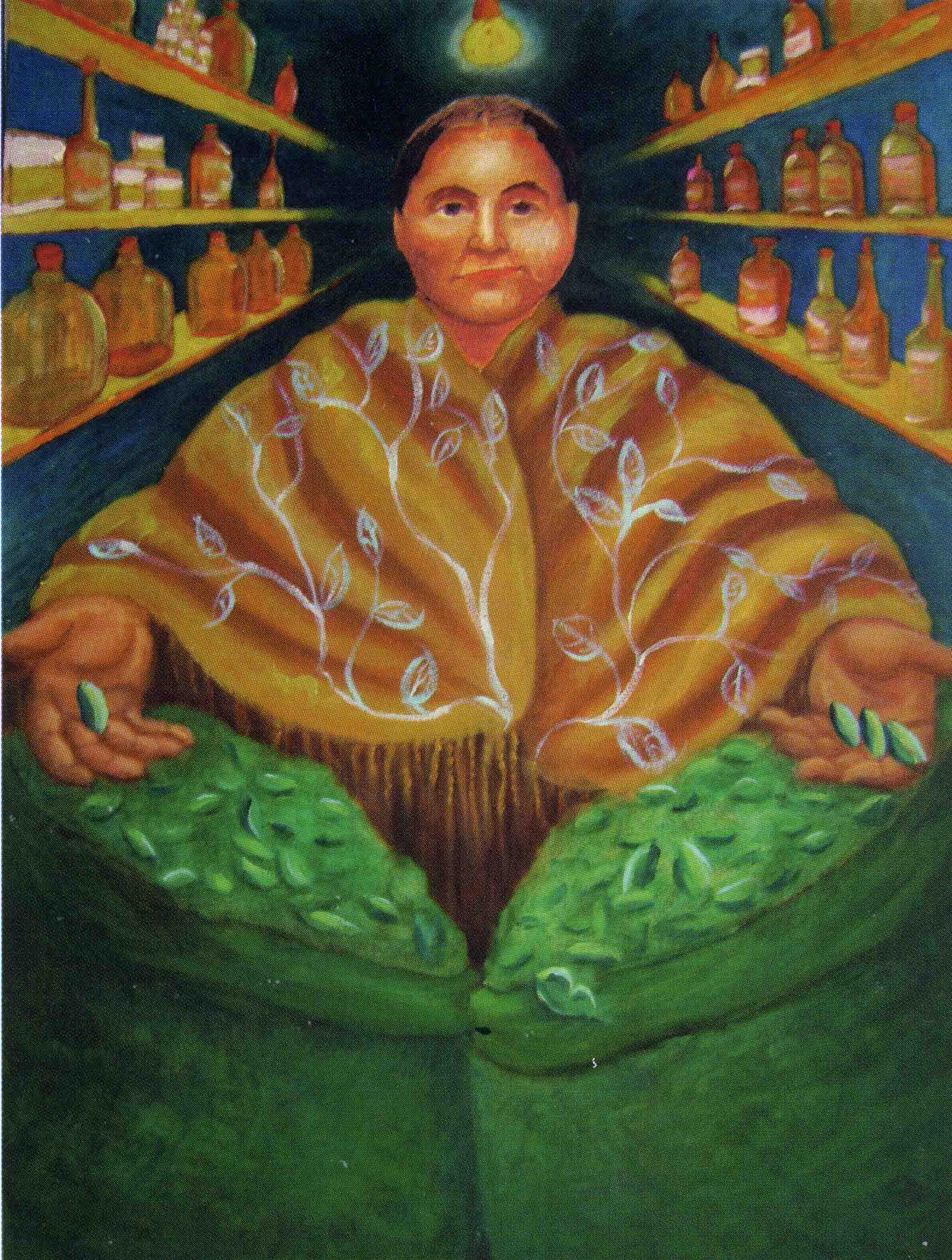
Her words continue to swell when she
extends her viewpoint outward, such as "Each person, a black-clad spark of soul,
pulled by the inexorable gravity of
survival. Together the seething mass of
humanity ran. In their black mourning
clothes, they were like primordial
darkness churning. The light of humanity
in their hearts bound each to the other as
if to birth a new galaxy of life, in
Warrior Town."
It's obvious Lynette knows how to write
powerfully. I also appreciate how real and
down-to-earth the language is, how honest
and wholesome this book. It's hip in a DIY
kind of way, with Lynette doing a tour on
bike for this book as activism inspiring
others to follow their dreams and stand up
for peace, and play. It also is a great
example of what David Shields call for in
his manifesto Reality Hunger, which is
taking the world by storm now. Lynette
Yetter's Lucy feels real, and the events
occurred in the way that anything occurs
in our memories�as fictional stories we've
told ourselves repeatedly and bundled into
plot packages.
One of the things I like best is that she
includes the vantage point of manifesting
and finding our future and doesn't just
include the times her intentions worked.
Her idealism, naive ideas of the
simplicity of finding her heart's desire
are sweet, and ironic when faced with
reality. She manages to keep her humor
about the ups and downs that causes,
though she feels such things very
passionately, and they can shake her. Her
naive idealistic determination makes her
follow the sound of panpipes to Peru,
where she plays in various venues, joining
in with indigenous musicians, as she
believes the sound can help create visions
of harmony for others as it did for her.
She believes she can make a difference to
bring more peace to this world through
them. But it's just that quality, and her
passionate empathy and love, that create
the inspiring events of this book.
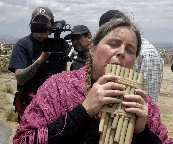
Lucy takes on oppression and segregation,
pointing out the false flag of 911, the
cultural imperialism of missionaries, the
modern tendency to block people out of
simply going out and camping under the
stars, and she wonders at anomalies of
government/military connections. In South
America, she plays indigenous peasant
music only recently made legal, and has no
trouble associating with citizens in
the Andes who disrespect unfair political
authority, and encourages harmony in
dangerous situations. Even in competitive
traditions she fosters a sense of oneness.
She acknowledges how magical the world is
through synchronicities such as running
into the man who wrote a song she was
playing. Yet, this isn't a treatise on
creative visualization. The irony that can
undercut such magic becomes obvious when
she gets to know the song's author. I love
that combination. She's not living out
some formula, pretending it always works.
So, when her intentions do manifest, her
visions do come true, they are far more
believable and powerful.
We learn about Andean folklore, such as
the respectful relationship of miners to
the Tios, earth spirits who live
underground. We also learn that kusillos
are androgynous entities who bridge the
known and unknown. And we follow
closely: shocking international business
practices, the role of civil disobedience
in social progress, and the involvement of
the U.S. in civil war. This book made me
cry for a long time, tremble, and even
shout out loud.
David Shields would like her book. In his,
Reality Hunger, which also came out in
2010, he claims "Most, perhaps even all,
good work (or, okay, work that excited me)
eludes easy generic classification: once
we know it's coloring entirely within the
lines called 'novel' or 'memoir' or
'Hollywood movie,' I honestly don't see
how anything emotionally or intellectually
interesting can happen for the reader. . .
. Just as out-and-out fiction no longer
compels my attention, neither does
straight-ahead memoir."�
I asked Lynette about the fiction/memoir
interface: "My book and reality. It is
heavily based on my own personal
experience in Peru and Bolivia.
In order to better tell the Truth, to
express Reality, I chose to fictionalize
my experiences. As an old hiking buddy and
PhD in English once told me, fiction is
where we express the deeper truths of
life. In short, she said, "Fiction rocks!"
Lucy Plays Panpipes for Peace started out
as pure memoir emails sent to friends
and first person stories I told at
performance spaces in Los Angeles.
But, it was too limiting to stick to
chronological events and specific people.
By fictionalizing reality I can lump many
people into a single character who then
becomes an archetype. And in that process,
new characters�100% fictitious�are
sometimes born. My favorite is Aunt Bert.
Aunt Bert came to me in a vision, you
might say. I was riding in a bus along the
shores of Lake Titicaca, when suddenly
Aunt Bert appeared in my mind. She told me
her life story. As I looked out the bus
window at the scenery passing by, I was so
moved by her life that I even cried at the
sad parts. And when I got to where I was
going, I wrote down what she had told me.
That is how Aunt Bert came to be in the
book.
Speaking of reality, to me Aunt Bert is
one of the most real characters in the
novel�yet she is 100% fictitious.
Reality is so multi-dimensional. On one
hand, it is the material world we can
document with calendars and cameras and
weights and measures. Yet it is also the
invisible realm of the mysterious that
animates all of life�is life. By
fictionalizing the material world, I
strive to reveal the deeper truths of what
is invisible yet is the most powerful
truth of all�our own lives."
David Shields asks if character is either "real" or "imaginary"?. . . . To be alive
is to travel ceaselessly between the real
and the imaginary, and mongrel form is
about as exact an emblem as I can conceive
for the unresolvable mystery at the center
of identity.�
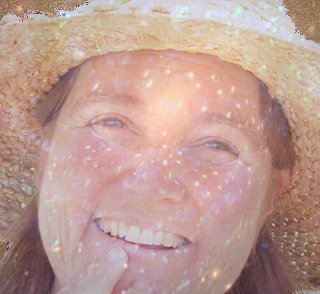
I can feel this book in my heart. I know
Lynette bravely accomplished the amazing
feats in this story, yet it isntt a heavy
handed recitation of her travels, or an
SGI tract, but a call to go into our
deepest selves, to cry, because there is a
reality there that the fictionalization
allows to live in a moving way, inside of
us. There is no boundary between story and
life, Lucy and Lynette, or our hands, wet
with tears, and the pages they turn, which
catch the light of the sun, that is not
separable from the light of consciousness.
 Get
Inspired to follow your dreams! Get
Inspired to follow your dreams!
Review
by Ellen Snortland
"The
blurb on the back cover of 'Lucy Plays Panpipes
for Peace, a novel' is true - 'In many respects,
you are an inspiration to me! You walk the
talk, and live in accordance with your beliefs."
Anyone
who has ever dreamed of learning a foreign
language (or two) and moving to a remote country
seeking a simpler, more authentic life, should
read “Lucy Plays Pan Pipes For Peace.” This
novel, based on Lynette Yetter’s experiences,
opens doors to places and people I never would
have known otherwise and I feel richer and more
whole for the experience.
In a
poetic and musical way, our guide sweeps us
along with Lucy on her quest to Peru and Bolivia
to find or create the peaceful world that she
senses in the sound of the panpipes. I laughed
and cried and felt inspired as if I, too, were
playing the panpipes with indigenous men in
traditional festivals or chewing the sacred coca
leaf with a Quechua family in a humble adobe
house or offering up my own life in protest of
U.S.-supported human rights abuses.
Spiritual
poetry
(that amazes me with its creativity), weaves
seamlessly with fascinating cultural details
(that only an insider could know) and with
commentary on globalization as seen from the
“globalized” citizens perspective in a way that
is natural, thought-provoking and inspiring.
Once I
started reading I didn't want to stop. Also, I
enjoyed the illustrations - they add a whole new
level to the experience of questing together
with Lucy towards this mystical world of which
the panpipes sing.
- Ellen Snortland,
author of Beauty Bites Beast and playwright
of Now That She's Gone
 Lynette Yetter Lynette Yetter
World Music
VOL. 2 - NO. 11 www.indieintune.com
By: Susan Frances
If you can imagine what air, water, fire, and earth sound like in music notes, then you can imagine what Lynette Yetter�s songs sound like. The verses are spiritual in nature and have a worldly richness. Lynette Yetter is a wind player, singer, and composer trained in chamber music and jazz flute. She fell in love with the panpipes and uses them as her chief mode of expression.
For this album entitled �Inka Spirit, Espiritu Incaico�, she played panpipes, kena, drum, antara nazca, kena chincha, percussion, and lead vocals. Joining her are Hiroyuki Akimoto on guitar and harmony vocals, Juan Carlos Cordero on guitar and harmony vocals, Rosario Paredo on charango, and Alejandro Alarcon on panpipes and kena.
Her song �Memory� is an instrumental piece that uses these wind, string, and drum tools in a delightful array of swirling, airy, and high rising motions. It sounds like the wind blowing as it rumples ocean waves, kindles fires and swishes through earth's fauna and flora. The fluxes and peaks in the instrumentation are natural and possess musical aspects in ethnic music from South America and Japan.
Her song �Nam Myoho Renge Kyo� is pronounced with a Western Andes seasoning and peaceful chants as the lyrics recite:
�We are rich in spirit
We are the Pachamama (space/time continuum)
We are the Virgin (Mary)
We are divinity
We are eternity
With our music and culture
We can change the world.�
The song makes humans one with nature through the vibrations echoing in the bamboo reeds. Her song �Noqa Minero Kani� is a trance like mix of swirling pipes, gorgeous moving textures, expansive wavelengths, and sensory chanting. Her music gives nature its own expressive sound.
|
|

